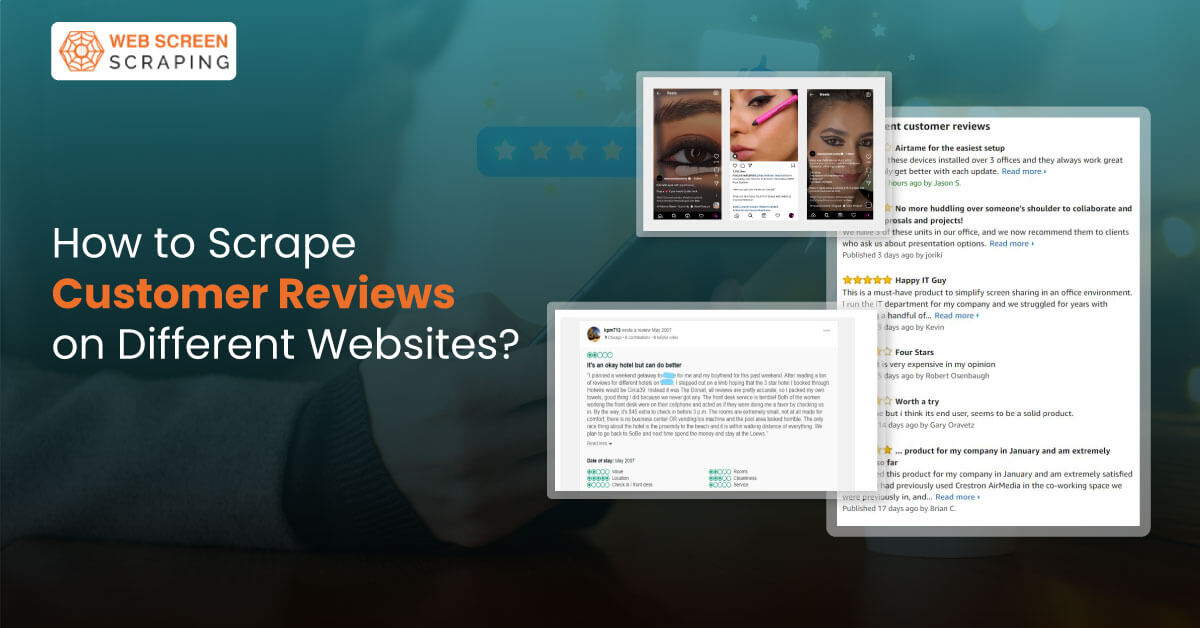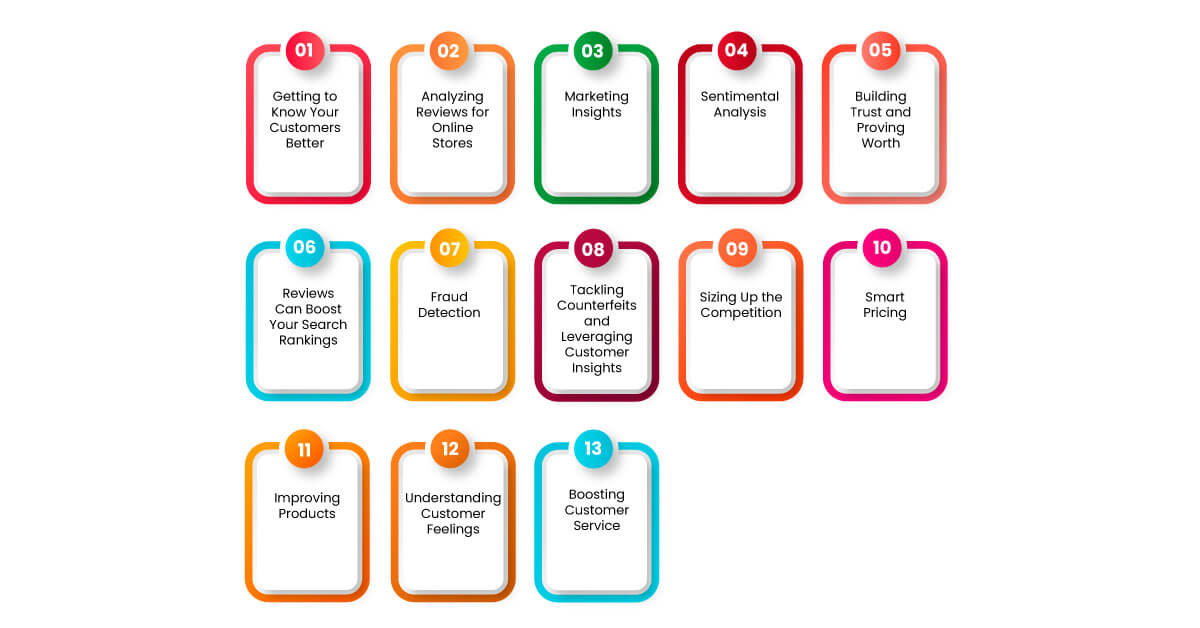
In digital marketplaces, customer reviews hold immense power. Reviews have high intrinsic value. They shape brand reputation and influence purchase decisions. Reviews also provide businesses with a straight idea of how their brand and products are perceived by customers. Insights obtained from customer reviews (including competitor reviews) can help businesses improve their online website, product listings, and services. It can also suggest brands to explore new products, improve existing ones, or even enter new markets.
Collecting and analyzing customer reviews can help businesses understand what brings their website traffic, what persuades/dissuades their customers, and which factors (price, service, product qualities, after-sales, or experience) matter to customers the most. For all these reasons, ecommerce businesses need to deploy proper tools and strategies for scraping customer reviews from different websites and platforms.
This post will help businesses scrape customer reviews on different websites without hassle and in the most cost-effective way.
What is Customer Review Scraping?
Customer Review Scraping is an automated data extraction process where the ‘data’ is –reviews or customer feedback. E-commerce websites, review sites, digital marketplaces, e-stores, social media channels, and even Google Business reviews are key sources from where these reviews are extracted. In other aspects, it is a market research technique to obtain customer perception data or customer sentiment data at scale. It is called scraping as it is generally done without manual intervention. Web scraping tools and techniques are used to collect reviews.
Types of Customer Reviews that are Scraped
- Buyer Reviews on Ecommerce platforms like Amazon
- Customer Reviews on different e-stores, e-commerce websites
- Reviews and ratings on mobile app stores (Apple App Store, Google Play Store)
- Comments and product ratings on platforms like YouTube, Vimeo, or TikTok
- Specialized review platforms like Yelp, TripAdvisor, or Trustpilot
- Sites like G2, Capterra, or Software Advice
- Influencer Reviews and Sponsored Content
- Social media posts mentioning products
- Google business reviews
- Star rating of vendors, products, and services
Top Benefits of Scraping Customer Reviews From Different Websites and Ecommerce Platforms

In today's fierce online marketplace, customer reviews are a powerful way for businesses to shine with powerful insights into their side.
Getting to Know Your Customers Better
Knowing your customers is key to business success. Reviews give useful feedback to enhance products, services, and customer care, leading to more sales and happier clients. Plus, good reviews attract new customers and build trust, fostering loyalty.
Analyzing Reviews for Online Stores
Online sellers are gathering data on top and bottom-rated products to decide what to stock. They're looking at customer reviews to see where competitors excel or fall short, and using these insights to improve. This might mean using better fabric, ensuring tighter packaging, or making sure help is available for assembly when items arrive.
Marketing Insights
Often, people react to marketing campaigns on social media and forums with text, videos, and memes. This helps companies understand how customers feel in real-time. These insights can quickly shape new content that responds to current interests. The reverse also happens – marketers spot trends in reviews and discussions and use them as starting points for campaigns.
Sentimental Analysis
Natural language processing (NLP) helps machines grasp the meaning behind human language. NLP powers voice assistants like Siri, Google Now, and Cortana, as well as translation services and AI systems. These systems need lots of data to work well. Product reviews from online stores are perfect for training NLP systems because they're created by real users.
Building Trust and Proving Worth
Positive feedback builds trust with potential customers, making them more likely to choose your company. Reviews also help businesses spot areas to improve, boosting customer satisfaction. In short, customer reviews are essential for attracting new clients and keeping current ones.
Reviews Can Boost Your Search Rankings
Customer reviews can greatly improve your search engine optimization by adding relevant keywords, showing social proof, and providing fresh content.
Fraud Detection
Customer reviews can also be analyzed to detect fraudulent activities and maintain trust in online marketplaces.
Tackling Counterfeits and Leveraging Customer Insights
Fake products pose a serious threat to brands, hurting sales and customer trust. Scraping product reviews can reveal signs of potential fraud. A spike in negative feedback might signal counterfeit goods in the supply chain. Quick or real-time data collection can help identify partners breaking agreements.
Sizing Up the Competition
Analyzing rivals' product reviews offers valuable insights into their strengths and weak spots. This knowledge can drive product improvements, uncover market opportunities, and shape more effective marketing plans.
Smart Pricing
Combining review analysis with pricing data helps businesses find the sweet spot for their products. This approach balances customer satisfaction and profits, ensuring competitive market rates.
Improving Products
Scraped reviews provide a goldmine of customer preferences and needs. This information guides product teams in creating new features, enhancing existing ones, or even developing brand-new offerings based on user feedback.
Understanding Customer Feelings
Large-scale review scraping allows businesses to gauge overall customer satisfaction and spot trends. This foresight helps predict market shifts and make proactive business choices.
Boosting Customer Service
By examining scraped reviews, companies can pinpoint common service issues and pain points. This knowledge helps train support staff, improve help resources, and enhance the overall customer experience.
Tools, Techniques, and Methods to Scrape Customer Reviews
Use a Web Scraper
Web scrapers are automated tools designed to extract data from websites.
- Highly customizable and flexible
- Requires programming knowledge
- Can handle complex scraping tasks
- May require maintenance as websites change
Example: X-Byte Web Scraper, Beautiful Soup, Scrapy, Selenium, etc.
Use Web Scraping API
Web scraping APIs provide pre-built solutions for extracting data from websites.
- Easy to use with minimal setup
- Handles complex scenarios like JavaScript rendering
- May have usage limits or costs
- Less flexible than custom solutions
Example: Web Screen Scraping API, X-Byte Data Scraping API, etc.
Use a Custom-built Web Scraping Tool
Developing a custom tool tailored to specific scraping needs.
- Highly customizable to specific needs
- Can handle dynamic content and interactions
- Requires more development time
- May need frequent updates as websites change
Example: Custom Scraping Tool by Web Screen Scraping
Use Services of Professional Web Scraping Services Provider
Outsourcing web scraping to specialized companies.
- No need for in-house development
- Can handle large-scale scraping projects
- May be costly for ongoing needs
- Less control over the scraping process
Example: Hiring a service like Web Screen Scraping
Note: If you have some technical know-how then you can use the below methods too:
Use PHP-based Data Collection
Using PHP to scrape websites, suitable for server-side scraping.
- Good for server-side applications
- Can be integrated with existing PHP projects
- May struggle with JavaScript-rendered content
- Requires proper error handling and rate limiting
Example: Simple PHP scraper using cURL
<?php
$ch = curl_init('https://example.com/product-reviews');
curl_setopt($ch, CURLOPT_RETURNTRANSFER, true);
$html = curl_exec($ch);
$dom = new DOMDocument();
@$dom->loadHTML($html);
$xpath = new DOMXPath($dom);
$reviews = $xpath->query('//div[@class="review-text"]');
foreach ($reviews as $review) {
echo $review->textContent . "\n";
}
?>
Use Java Web Scraping
Utilizing Java libraries for web scraping tasks.
- Robust and scalable for large projects
- Good performance in heavy scraping tasks
- Steeper learning curve compared to Python
- Strong typing can help prevent errors
Example: Using JSoup library
import org.jsoup.Jsoup;
import org.jsoup.nodes.Document;
import org.jsoup.select.Elements;
public class ReviewScraper {
public static void main(String[] args) throws Exception {
Document doc = Jsoup.connect("https://example.com/product-reviews").get();
Elements reviews = doc.select("div.review-text");
for (Element review : reviews) {
System.out.println(review.text());
}
}
}
Use Tools like Beautiful Soup
Beautiful Soup is a popular Python library for parsing HTML and XML documents.
- Easy to use and learn
- Great for parsing and navigating HTML structures
- Works well with static content
- May need additional tools for dynamic content
Example: Beautiful Soup with requests
import requests
from bs4 import BeautifulSoup
url = 'https://example.com/product-reviews'
response = requests.get(url)
soup = BeautifulSoup(response.text, 'html.parser')
reviews = soup.find_all('div', class_='review-text')
for review in reviews:
print(review.text)
Wrapping Up
Each method has its strengths and is suitable for different scenarios. Consider factors like the scale of your project, technical expertise, budget, and specific requirements when choosing a method for scraping customer reviews. Always respect website terms of service and legal considerations when scraping review data.
Remember to implement proper error handling, respect robots.txt files, and use appropriate delays between requests to avoid overwhelming the target websites. Ethical scraping practices are crucial for maintaining a healthy web ecosystem.

